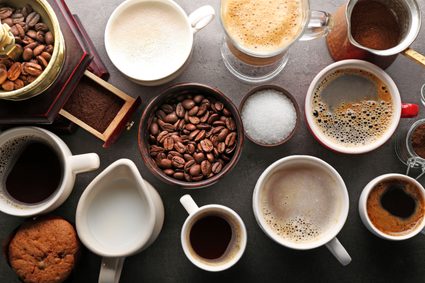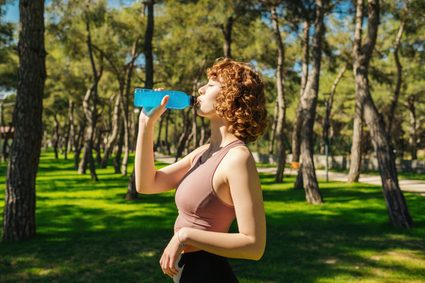Coffee Kick Calculator
Thanks to the stimulating properties of caffeine, coffee is the number one drink when we're finishing a project or cramming before an exam. But how much and when exactly should you drink to ensure you'll remain focused until the end of the exam you've been studying for the entire night?
Our calculator predicts the level of alertness and shows it as a cool visual graph, depending on the time you've slept and the dose of caffeine you've ingested. It uses a scientifically proven formula based on research on soldiers in a state of sleep deprivation. If you have a long night ahead of you, just choose one from the most popular caffeinated drinks and pick the time of each separate dose — your anticipated activeness level will be visualized below!
In the article, you can find the formula used in the coffee kick calculator, how much caffeine you can have a day, and how much caffeine is in a cup of coffee.

How to use the coffee kick calculator
Every now and then, we're forced to finish some work in a very limited amount of time. Sometimes, it's the nature of our job, sometimes a result of our procrastination — no matter the reason, it's a situation that requires extraordinary action measures. Luckily, there's our coffee alertness calculator.
1. Enter how rested you are. Did you sleep well the whole night? Or maybe it was a very short night for you? Include the time you woke up today.
2. Input how many servings of caffeinated drinks you're planning to have today. You can plan your day with up to five different caffeine drinks.
3. Describe each caffeine drink you've consumed or you're about to consume today:
- Input the drinking time;
- Choose which drink you'll have; and
- Enter the number of servings.
4. Decide what you want to see on the graph:
-
Alertness — we assumed that your alertness is 100% immediately after a full night of sleep. Alertness is a measure of your reflex and ability to stay focused. The higher it is, the better for you.
-
Response time — it's a negative measure of your reflex — the sleepier you are, the slower you react. It tells you how much time you need to respond to any stimulus. You surely want to keep it as low as possible.
-
Reaction speed — it's a positive measure of your reflex — the more energetic you are, the higher your speed (mental and physical). As opposed to response time, you should keep it at a high level.
5. The graph below the calculator shows your predicted alertness. Play with the number, time, and values of doses to see how the performance improves or drops!

If you are in a café, don't forget to tip for your coffee! It's a good thing to share your joy with others.
The caffeine effect formula
The formula we used in our calculator was developed by a team of scientists in the U.S. Army Medical Research and Materiel Command, Fort Detrick, Maryland. They described it in detail in the article titled .
It turns out that about 40 percent of U.S. soldiers sleep only five hours a day (and even less in extreme situations such as combats), while the Centers for Disease Control and Prevention says that ordinary people need eight to nine hours of sleep. Scientists thus decided to conduct research to keep the army in excellent form throughout the day. Their studies lasted for over ten years, but they eventually found an applicable formula!
They assessed the soldiers' alertness using a unified performance test in 7 different sleep deprivation schedules: from 5 hours of sleep per night to continuous sleep loss for 85 hours. They tested six different caffeine doses: from placebo to repeated 200 mg doses to a single dose of 600 mg. They developed a formula that accurately predicts group-average psychomotor vigilance task performance results! It works for a wide range of sleep schedules and caffeine dosage combinations.
In short, the formula helps find strategies to optimize neurobehavioral performance. Scientists claim that the algorithm they created (and used by our calculator) can improve performance and attention by 64% while decreasing caffeine consumption by 65%. You can now predict how much caffeine you should drink and when to achieve peak alertness.

What is caffeine, actually?
Caffeine is the most popular psychoactive drug in the world, mostly recognized for its ability to alleviate fatigue. It's a chemical compound naturally found in coffee beans, tea leaves, and a few less-known plants: kola nuts, guarana berries, and yerba mate leaves.
According to the published in 2017 by an international team of scientists led by doctor Jennifer L. Temple:
Caffeine can influence objective and perceived cognitive performance by increasing alertness and wakefulness. (...) The impact of caffeine appears to be greater under conditions that would negatively impact performance, such as acute caffeine withdrawal or sleep deprivation.
Besides mood elevation, energy boost, and arousal, caffeine has been proven to have a lot of positive influence on health! Its moderate consumption (up to 300-400 mg a day) to a lowered risk of:
- Stroke;
- Congestive Heart Disease (CHD);
- Diabetes;
- Parkinson's disease;
- Alzheimer's disease; and
- Overall mortality!
How much caffeine is in a cup of coffee, tea, and energy drinks?
In coffee, the caffeine content depends on the kind of beans, roasting, and brewing process. A similar principle applies to tea: different types of tea leaves, growing conditions, processing practices, and brewing techniques have an impact on the energizing properties of the drink.
Energy drinks and shots, however, need to meet standards of uniformity, so you can count on them if you want a really accurate caffeine dosage. Check the value on the packaging.
In the table below, you can find the average caffeine content of different kinds of caffeinated beverages. These are the numbers used in the calculator:
Drink type | Caffeine content [g/L] | Standard size | Caffeine dose in a portion [mg] |
|---|---|---|---|
Espresso | 1.5 | 1 fl oz (30 ml) | 75 |
Filtered coffee | 0.6 | 8 fl oz (236.6 ml) | 142 |
Instant coffee | 0.4 | 8 fl oz (236.6 ml) | 94.5 |
Latte | 0.19 | 8 fl oz (236.6 ml) | 45 |
Mocha | 0.214 | 7 fl oz (210 ml) | 45 |
Flat white | 0.474 | 6.4 fl oz (190 ml) | 90 |
Americano | 0.25 | 6.3 fl oz (180 ml) | 45 |
Capuccino | 0.265 | 5.7 fl oz (170 ml) | 45 |
Decaf | 0.04 | 8 fl oz (236.6 ml) | 9.5 |
Covfefe 🤯 | 3 | 1 wall (2000 miles) | powerful |
Black tea | 0.15 | 8 fl oz (236.6 ml) | 35.5 |
Green tea | 0.09 | 8 fl oz (236.6 ml) | 21.5 |
Yerba mate | 0.3 | 8 fl oz (236.6 ml) | 71 |
Energy drink | 0.33 | 12 fl oz (330 ml) | 109 |
Yerba mate drink | 0.33 | 12 fl oz (330 ml) | 109 |
Energy shot | 3.3 | 2 fl oz (60 ml) | 198 |
Coke | 0.1 | 12 fl oz (330 ml) | 33 |
Diet Coke | 0.13 | 12 fl oz (330 ml) | 43 |
Of course, "covfefe" isn't a real drink. It's just a 😂
🙋 How much does your coffee weigh? Try our ml to grams calculator. And if you reason in cups (maybe a better unit for coffees), try out the grams to cups calculator!
How much caffeine a day can you have?
Scientists that 400 mg of caffeine is considered a maximum safe everyday dose. You'll find this much in three cups of strong filter coffee, five espressos, or ten small cans of Coke. The same review suggested that women of reproductive age shouldn't consume more than 300 mg of caffeine per day, and children should consume less than 2.5 mg per kilogram body weight (e.g., that makes 75 mg for a 30 kg child).
It's very hard to overdose on caffeine — death from its ingestion is very rare. Caffeine irritates the stomach, so ingesting it in massive doses would induce vomiting. Sure, overconsumption of products containing high caffeine levels brings patients to the emergency room. In most of these cases, the incident involves unusually high doses of caffeine (over 3 mg per kilogram body weight). Overdoses of diet pills and stimulants cause most deaths after caffeine intoxication, and most occur in young patients who don't know they have heart disease.
🙋 Find out how many tablespoons of coffee to put in your cup with out grams to tablespoons calculator.
Signs that you're having too much
Some symptoms you may experience if you've drunk too much coffee can make you feel uneasy. Don't panic. They're going to pass. Just don't drink another cup. You should watch for the following:
- Headaches — caffeine can trigger both light headaches and migraine attacks;
- Trouble falling asleep;
- Fast and strong heartbeat;
- Nervousness, irritability;
- Frequent urination and bowel movements;
- Stomach discomfort or heartburn (it's a sign of irritation of the stomach); and
- Fluttering hands.
Remember that everyone metabolizes caffeine at a different speed — some people are more sensitive to it than others. If you don't drink caffeine regularly, you may be prone to experience more of its negative effects. Caffeine sensitivity can also depend on body weight, genetic inclinations, drug interactions, and health conditions.

What to do after sleep deprivation?
You probably feel exhausted, but if that's not the case, don't let yourself believe your body took such effort lightly. Take a well-deserved rest! In your everyday routine, remember to get hydrated, exercise, and eat healthily. Make sure you don't strain yourself like this too often!

How long does it take for coffee to kick in?
Coffee usually takes about 15 to 30 minutes to kick in. This can vary depending on your body and the type of coffee. After you drink it, you should start to feel more alert and energetic as the caffeine begins to work.
How much caffeine is enough to wake me up?
About 100 to 200 milligrams of caffeine, or roughly one to two cups of coffee, is usually enough to wake you up. This amount can make you feel more alert and improve your concentration. However, everyone's sensitivity to caffeine is different, so the exact amount can vary from person to person.
How can I determine the duration of a coffee kick?
To determine the duration of a coffee kick:
- Note the time you drink your coffee.
- Observe when you start feeling more alert; this usually happens within 15-30 minutes.
- Keep track of how long the alertness lasts. For most people, it's 3-5 hours.
- Repeat a few times and average the results for a more accurate estimate, as they may vary daily.
Which coffee beans will give you the biggest caffeine kick?
To get the biggest caffeine kick, consider these coffee beans:
- Robusta — typically, it has double the caffeine of other types.
- Light roast — they retain more caffeine during roasting.
- Espresso beans — specially roasted for a robust, concentrated flavor and high caffeine.
Choose Robusta or high-caffeine specialty beans for the most energizing effect.